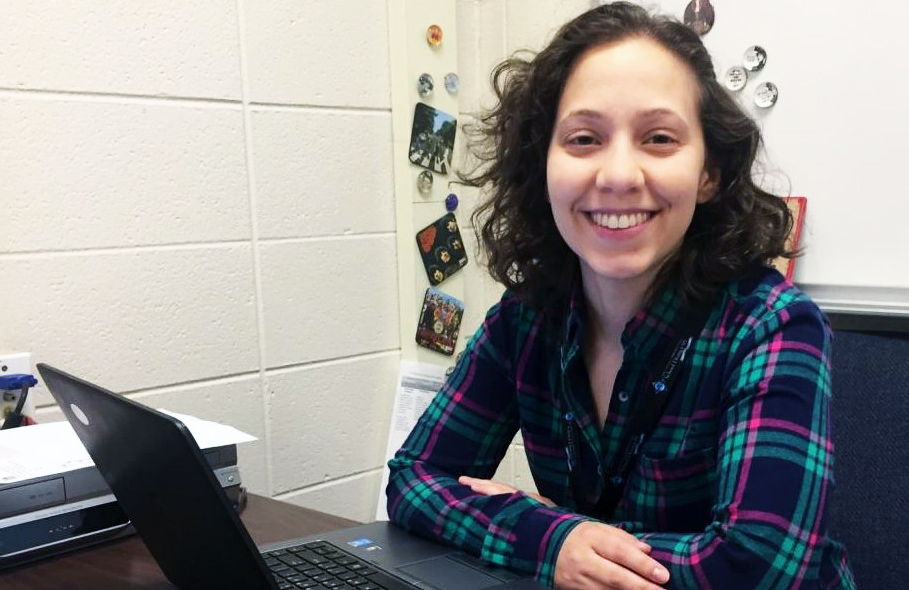Scholar-Practitioner: Kim Ferraro, Prepared for Success
by Tom Hanlon / Jan 15, 2021

Kim Ferraro, recognized as one of Illinois’ top teachers through a prestigious fellowship she recently received, reflects on the many ways the College of Education primed her for success in the classroom.
Kim Ferraro learned a vital lesson from Mister Rogers—yes, that Mister Rogers—when she took an educational psychology course at the University of Illinois Urbana-Champaign.
More precisely, she learned how to plan lessons from a class Dr. David Zola taught. Zola, a clinical professor in the Department of Educational Psychology, used Mister Rogers’ simple yet effective approach as an example.
“He showed clips of how Mister Rogers would introduce what the kids were going to learn that day, how he was going to go about it, and then a reflection at the end,” says Ferraro, a 2015 graduate of Illinois who is in her fourth year of teaching at Lake Zurich (IL) High School.
At first, Ferraro didn’t get it. But in a discussion class of Zola’s, it clicked. “I saw how Mister Rogers was showing you how to create a lesson plan based on what you want the kids to achieve, how you go about it, how you angle it, how you engage in it,” she says. “That stuck with me.”
That’s not the only thing that stuck with Ferraro during her time in the College of Education.
Learning to Reflect
“I learned how to reflect on what I do, how to measure how successful I am, what things I would change,” says Ferraro, who currently teaches AP Human Geography and U.S. History. “A lot of my administrators have told me my reflections are very good, because I’m able to articulate what I can improve. And that’s helped me be a decent teacher. I can always be better, but I’m a decent teacher.”
She is more than a “decent” teacher, at least as measured by the $24,000 James Madison Graduate Fellowship she received in 2019. The fellowship is geared to help secondary level history, government, and civics teachers become outstanding educators of the U.S. constitution. Ferraro is one of only two teachers in Illinois, and one of 53 in the nation, to receive the fellowship, which she is applying to the pursuit of her online master’s degree through Ashland University.
Teaching How to Think Critically
Another valuable lesson that Ferraro learned in essentially every class she took through the College is the ability to think critically—and to pass that ability on to her students. “It’s not just about memorizing dates and facts,” she says. “That’s not what’s important. What’s important is helping students to think critically, to make connections from the past to the present so we can understand the world we live in.” That lesson was driven home in numerous ways; Ferraro recalls preparing lesson plans for the historical fiction book, Chains, by Laurie Halse Anderson, depicting slavery during the formation of America, as one way she learned to teach students how to think critically.
“I love the College of Education,” Ferraro says. “I absolutely keep those preservice observations in mind, as well as going into the schools, observing student teaching, getting as many tutoring hours as possible. It’s all about the practice.”
Prepared for Change
It’s also all about being ready for curricular change, which, she says, the College prepared her for. “The biggest new thing when I was coming out of Illinois was flipped classrooms. The College prepared me for curriculum change,” she says. “How I teach today is different from how I taught five years ago.”
Building Relationships with Students
Perhaps the most important lesson she learned through the College, however, is about relationships. “Students are responsive if they can sense you’re being authentic with them,” she says. “Most of your time as a teacher is spent building those relationships. Obviously, you need to understand the content you’re teaching, but you need to focus on the kids first. See how they are, what they’re doing, what they engage with. It makes everything else easier then.”
About the Scholar-Practitioner Series
The College of Education is profiling alumni to reveal how they are putting to use what they learned during their time in the College, and how that learning has impacted them in the field.